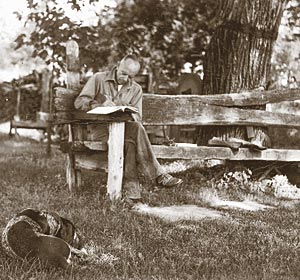Celebrating Leopold’s legacy
Aldo leopold has been called an American prophet, the father of wildlife management and an advocate for conservation. He was also a professor of wildlife management at the University of Wisconsin, where he founded the nation’s first academic wildlife management department.

Aldo Leopold writing at the famous Shack with his dog Flick, 1940.
Courtesy: Leopold Foundation
Leopold ventured beyond the confines of his field by experimenting with the revolutionary notion of restoring ecosystems damaged by human activity, both on his own land along the Wisconsin River and at the university’s arboretum.
His musings on that work and the relationships between people and nature are the basis of his 1949 book, “A Sand County Almanac.” With science, history, humor and prose, Leopold articulates the bond between people and the natural world; with the hope that readers would treat the land with love and respect.
Leopold could not have imagined the far-reaching impact his book would have. It caught the hearts and minds of many in the 1960s and 1970s as people became concerned about pollution and contemporary environmental problems. The book’s thought-provoking essays on the nature of nature can lead to discussions on the value of natural places and what Leopold called an ecological conscience.
Today, people worldwide consider the book to be the Bible of the modern environmental movement. More than 2 million copies have been printed and it has been translated into nine languages.
To celebrate the Leopold legacy, people are invited to the Arboretum Visitor Center, 1207 Seminole Highway, from 9 a.m.–12:30 p.m. on Saturday, March 1, for “Madison Reads Leopold,” part of Aldo Leopold Weekend. Leopold Weekend is a statewide event that honors Leopold’s contributions to our understanding of the environment.
At the Arboretum event, people will read aloud from “A Sand County Almanac” and other works to remind us of the importance of protecting our natural resources. Readers scheduled to attend include Madelyn Leopold, granddaughter of Aldo Leopold; Ron Seely, writer for the Wisconsin State Journal; Linda Brazill, writer for the Capital Times; and Madison Mayor Dave Cieslewicz.
Following the readings, participants can see the results of Leopold’s environmental vision on guided walking tours of the arboretum. Tours start at 1:15 p.m. All events at Madison Reads Leopold are free and open to the public.
Those wanting more Leopold should plan on attending “Riley Reads Leopold” from 11:30–2 p.m. on Sunday, March 2, at the Riley Tavern Annex, next to the Riley Tavern, located at 8205 Klevenville Riley Road near Verona.
UW–Madison Professor Emeritus Stan Temple, now senior fellow at the Aldo Leopold Foundation, will present an overview of Leopold and his conservation work, especially its impact on private lands. The story of Leopold’s influence on the landscape near Riley through the Riley Game Cooperative and a reading of Leopold quotes pertinent to the Riley area, led by Riley friends and volunteers from the audience, are also planned.
A pancake breakfast at the Riley Tavern will be available from 9 a.m.-noon.
For more information on activities at the UW–Madison Arboretum and Aldo Leopold Weekend, visit http://www.uwarboretum.org or contact Kathy Miner, 265-5872, kdminer@wisc.edu.
For information on the Leopold event at Riley, contact Janet Silbernagel, 265-8093 or 608–516-7273, jmsilber@wisc.edu.
Tags: ecology, environment, events



